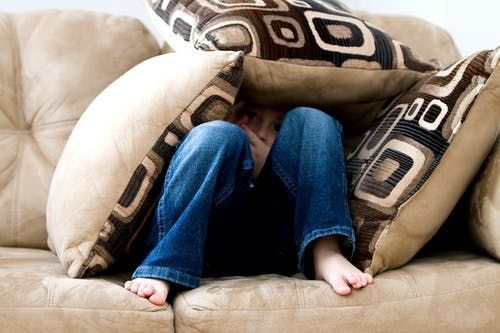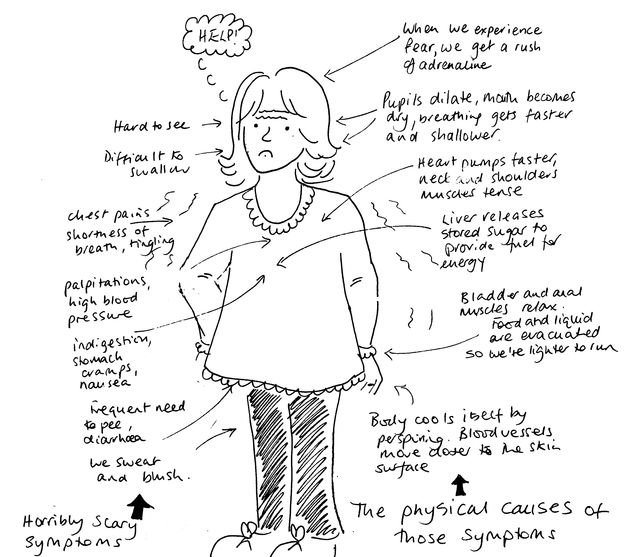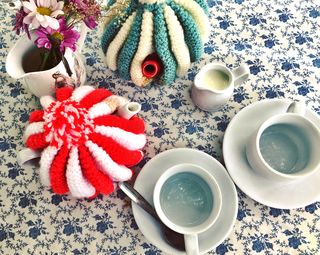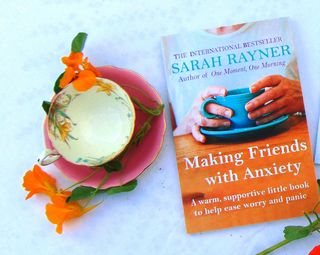Anxiety
Struggling to manage anxiety about the coronavirus pandemic?
10 ways to reduce panic and worry if you're self-isolating or in lockdown
Posted March 15, 2020 Reviewed by Lybi Ma

Thoughts whirling too fast? Utterly overwhelmed by the news? If you're experiencing Pandemic Anxiety, you are not alone.
Fear has spread in the wake of the Coronavirus outbreak to an unprecedented degree. Our news outlets and social media are global in their reach and technology can spread information faster than at any time in history. This can be useful – getting explanations of effective hand-washing out to millions in milliseconds – but for anyone prone to panic, it can also be one almighty trigger.
Headlines declaring the lion's share of the population will be infected, the British Prime Minister announcing ‘families are going to lose loved ones before their time’, endless photos on Facebook showing shops that have run out of provisions, talk of endless weeks of lockdown and self-isolation – all these fan the flames of panic.
Panic and anxiety produce a great many physical symptoms – palpitations, headaches, sweaty palms, flushing, difficulty focusing, diarrhea. The list goes on. As a result, thousands – possibly millions – of people are dealing with a host of very distressing symptoms whether they have Coronavirus disease, or not.

Here are ten ways to reduce worry and panic, most of which can be done if you’re self-isolating or limiting contact with others.
1. Turn off the news. Here's why it is a good idea:

- I’ve long ago noticed about myself that I am deeply uncomfortable living with uncertainty. Being in limbo is mentally horribly uncomfortable and a source of anxiety, like holding one’s breath for ages, breathing neither in nor out. My lungs feel tighter and tighter and when eventually I do breathe, I gasp in air, desperate and eager and thankful. It strikes me this is why the news at the moment is so stressful - it's as if the whole world is in limbo, waiting and watching on high alert, with everyone unsure of what's going to happen next. Seen like this, I feel it's quite reasonable to opt out of regular updates that only remind us perpetually how up-in-the-air everything is.
- A lot of what is being shared isn’t true. Only yesterday I read that COVID-19 has the greatest impact on the middle-aged and the virus will be killed off when we have 10 days at 27°C for instance. Both were fake stories, being widely shared. If in doubt, consult a site like Snopes.com which focuses on fighting misinformation.
- If it’s important, you’ll find out anyway. And if you find it hard to tune out of updates completely, check in once or twice a day and no more.
2. Hit ‘Mute’ if need be. On Facebook you can stop seeing posts from specific people for 30 days, or you can remain friends but silence their updates completely. Similar is possible on Twitter. I spent five minutes implementing this last night, and lo! My Facebook feed was more balanced and I felt like I could breathe.
3. Remember, we are predisposed to thinking negatively. As Melissa Shepherd reminds us in her helpful piece, Controlling Coronavirus Anxiety, ‘Our minds are made to protect us. As such, we are biased toward attending to potential threats. When you find yourself swept up in thinking about the scary things that could happen, it’s important to remember this tendency to overestimate the likelihood of a bad outcome.’

Anxiety is linked to fear. Humans are, of course, animals, and just as it pays a mouse, for instance, to think that a rustle of feathers might be an owl about to swoop down so it can run and hide, so it pays for us to think the worse so we can protect ourselves. Thus when statistics say there is a 1 percent mortality rate, we hear that much more loudly than we hear the fact we have a 99 percent chance of surviving. Attempting to drown out this negativity can result in a plethora of coping mechanisms/reactions, many of which are unhelpful, if completely understandable. Over-eating, drinking too much, obsessively cleaning, arguing with friends and family, laughing manically, not sleeping properly and getting tearful out of the blue - yup, I'm doing them all!
4. Anxiety is often worse in the mornings so start slow and build up gradually. Cortisol is a ‘stress’ hormone and builds up in the body in the night so when you wake up, your body is full of it. I find the mornings are invariably the worst time, when it seems like the day is yawning ahead of us full of scary stuff and misery. If you’re self-isolating currently, I would encourage you to take it one step at a time, and not try to think too far ahead. I tend to go, ‘I’ll just see how I am in an hour’ rather than planning lots for each day. A lot of anxiety is related to overthinking about the future – catastrophizing – and, unfortunately, we can’t control what is going to happen.
5. Remember anxiety feeds on itself. One of the cruelest tricks of anxiety is that panicking about panic makes it much worse. It makes your stress hormones (adrenaline and cortisol mainly) go into alert state and then we can get caught in a big cycle of worry. This is because when we are exposed to threats (see owl and mouse, above) and need to deal with them, the amygdala bit of our brain jumps into action. It’s been in our brains for thousands of years, when our lifestyles meant were meant we were more at risk of being eaten by hungry lions than we are today. Because all threats look like a hungry lion to the amygdala, it prompts you to act accordingly. To fight it, or flee. There is also the freeze response, which is what rabbits in headlights are apt to do. (A personal aside, years ago, when I was assaulted, I froze. For what must have been a minute, I could not speak. It was very weird and very frightening. Eventually I got my voice back and shouted 'F?!!CK OFF' to my attacker, and kicked him. But for a while, I was completely paralysed.)
Anyway, whilst it might feel we're being assaulted by the news etc., actually we aren't. But it does mean our heart rates goes up, we feel mega alert, our breathing gets shallower and faster and our muscles get ready for action. (See drawing above.)

So how can we break this cycle? I find here that there are things that help to calm me naturally and I'll recommend several activities here. Firstly, there are some breathing exercises that work a treat. They're in my anxiety book but there are some examples demonstrated here on YouTube.
Then there's the tried and tested favourite: exercise! If you’re not completely self-isolating at home, then going for a walk each day is a must. If you can go with a friend or partner and can talk AND walk you then get two forms of therapy in one. Or you could dance! The Italians have reminded us of the power of music to lift the spirits, singing from their balconies during lock down. Why stop there? Alongside listening and playing music, dancing is a great way to get your muscles moving and you can do it anywhere. Start simple: here are the moves to YMCA on YouTube.
6. I also find being with a pet such as a cat or dog is great. They are so comforting! They listen without judgement and remind us to live in the present moment. Because anxiety is connected to our ability as human beings to conceive of time, one of the most effective ways of calming the anxious mind is to become more ‘animal’, so to speak. When other mammals experience fear and have a rush of adrenaline, they don’t analyse their symptoms – a cat being chased by a large dog is unlikely to pause; he just high-tails it.

At its simplest, this is because our pets live in the present. When we follow their example and let go of ruminating on the past and worrying about the future and focus on the here and now, anxiety lessens. (Which is great, as it's an excuse for a pic of our cat as kitten pic.)
7. Be crafty. This week a friend asked if I’d draw her daughter’s kittens for her birthday, so I turned off the news and got out my art supplies. If you’re wobbly right now, try drawing, painting, colouring-in, sewing, whittling wood, knitting. You get the picture (if you’ll excuse the pun). And if none of these take your fancy, how about a virtual gallery tour? Lots of museums do this through Google Arts & Culture, including the Guggenheim in New York.

7. Read or listen to a book. Stories in all forms are a brilliant way of taking our minds off our worries – pick up a novel that will transport you away from the world of panic and your anxiety levels will naturally subside. However, when we are anxious slowing our thoughts enough to read can be hard, if not impossible. For those who find it difficult to quieten their inner demons, listening to someone else read aloud can help by replacing negative thoughts with something else. Discover more on why audio books are especially good for our mental health here.
Take a cue from others impacted by Covid-19: ‘Every day, I have tried to get up and exercise, cook and eat, write a diary and do some volunteer work. Taking action and doing things makes you feel better,’ says Guo Jing, 29, Wuhan (Guardian)

9. Be kind. Hopefully some of the suggestions above will help you be kind to yourself. But don’t forget, insofar as you can, to be kind to others too. As part of a #viralkindess campaign, postcards bearing the message “Hello! If you are self-isolating, I can help” are being dropped at doorsteps across the UK. You can download cards to drop to neighbors here. Being active about helping others can help boost your mood and reduce the anxiety of those who are most vulnerable.
10. Last, but not least, remember that in feeling hyper anxious you are not alone and what you are experiencing is completely normal. When I first had a panic attack, I thought I was going mad and having a heart attack, both at the same time. However, I have managed to survive another 35-odd years and whilst I have had some bouts of anxiety since (including this very week), by and large I have learnt to manage using various supports. Some find CBT hugely helpful. Others have been aided by medication. Meditation can play a part too. Exercise is another tool that I have in my kit, but I’m no Olympic athlete and you needn’t be either. I find it is many of these together that work best for me, along with talking to other sufferers and improving my understanding of what was happening to me physically as a result of my catastrophic thinking. In any event, please trust that heightened anxiety is not permanent.

You can never be rid of anxiety completely as it’s a natural physiological response, but its impact can be reduced. As for panic attacks, they can feel terrifying, but they do pass.
If we can bring our personal and collective levels of panic down, then we will feel better able to cope with the current situation. Meanwhile I wish you and your loved ones strength and courage, wherever in the world you are reading this.




